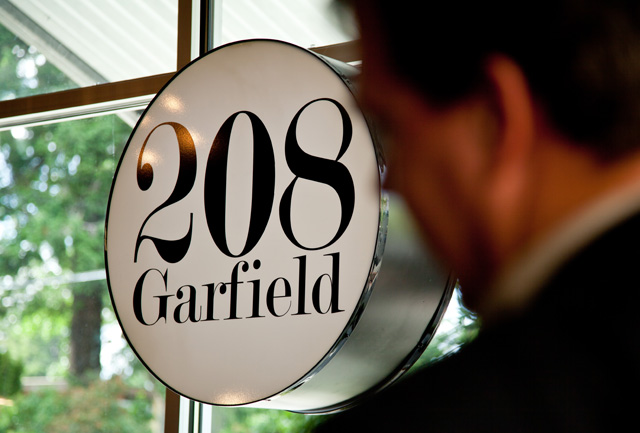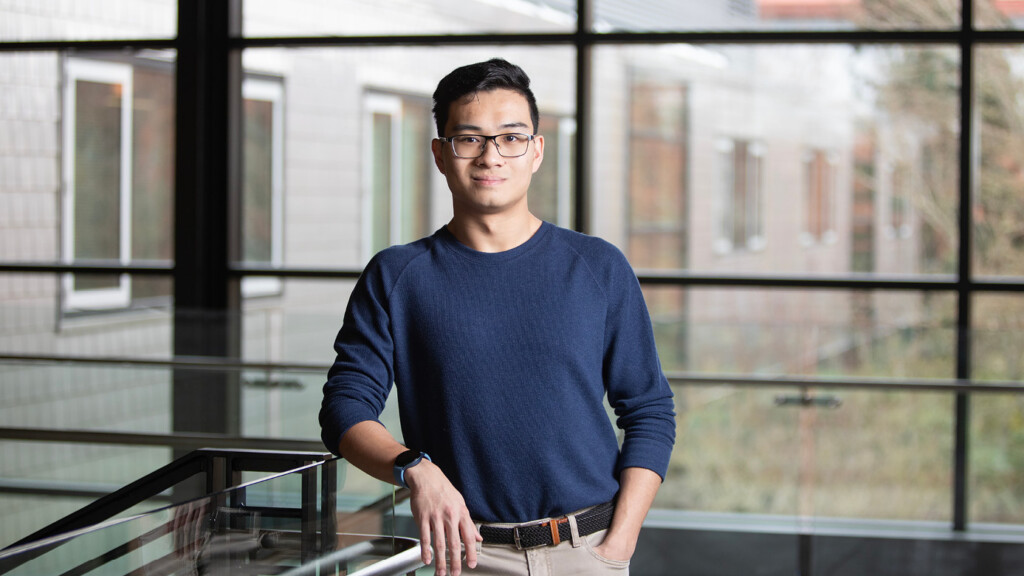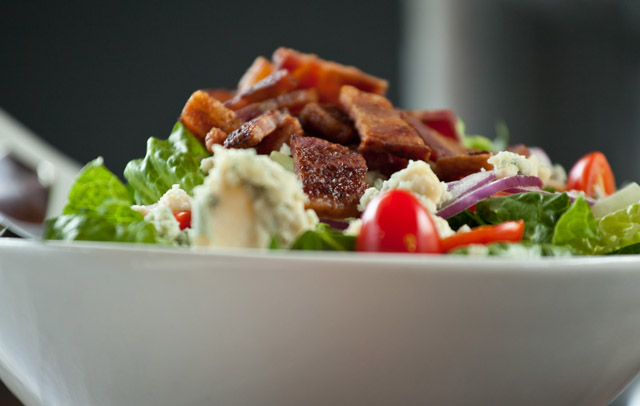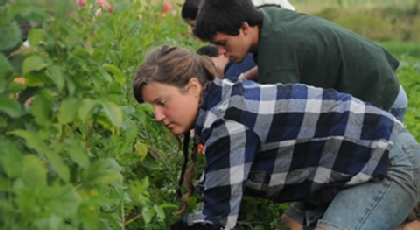Page 17 • (234 results in 0.031 seconds)
-
New Chemistry department instrument will help students and profs probe world of the atom It looks like a rather fat, squat water heater. But to the students and professors gathered around it – or, more accurately, the computer that transmits readouts from it, the machine…
September 3, 2009 New Chemistry department instrument will help students and profs probe world of the atom It looks like a rather fat, squat water heater. But to the students and professors gathered around it – or, more accurately, the computer that transmits readouts from it, the machine is pure magic. It is called a nuclear magnetic resonance spectrometer, or NMR. Today, the students from Professor Neal Yakelis’ organic chemistry lab are trying to figure out the structure of an unknown
-

208 Garfield offers so much more than coffee, from something to snack on to a drink at the end of the day. (Photos by John Froschauer) 208 Garfield, much more than a coffee shop By Chris Albert There’s a new flavor to Garfield Street at…
. “That was done very deliberately when we were creating the menu,” McGinnis said. “We wanted to create amazing dishes using simple local ingredients.” Coffee and those morning pastries (thanks to the PLU bakery) are still on the menu and the coffee is provided by Valhalla in North Tacoma, with selections like Organic Viking and Valkyrie blends. It should fit nicely with the Scandinavian Shop in the Garfield Book Company. But 208 Garfield is so much more than a coffee shop. The name will become
-

Professor Colleen Hacker brings experiences working with world-class athletes to students at PLU. Athlete. Coach. Educator. By Katie Scaff ’13 PLU professor of Movement Studies and Wellness Education Colleen Hacker rarely uses hypothetical situations to help her students learn new concepts —as an athlete that…
Olympic Games in 16 years. “It’s exciting to teach PLU students the same skills and strategies,” Hacker said. “One of the great joys for me is being a PLU faculty member.” Read Previous PLU profs and pastry professionals pack a presentation profoundly full of pickles Read Next PLU prof tells why editing organic chemistry textbook is actually fun COMMENTS*Note: All comments are moderated If the comments don't appear for you, you might have ad blocker enabled or are currently browsing in a "private
-
Erin Madden, Senior Capstone Seminar There is a discrepancy in the literature whether porous carbon electrodes store more electrochemical capacitance with a disordered or an ordered pore design.
Deoxyribonucleic AcidLuke Latimer, Senior Capstone Seminar Matrix assisted poling is a promising technique for improving acentric ordering of chromophores in organic non-linear optical (NLO) materials. The possibility of deoxyribonucleic acid functioning as an effective host material for enhancing acentric ordering by dye intercalation between base pairs is investigated. A dye, LL-1, which is predicted to intercalate and have moderate NLO activity, was synthesized. Through UV-Vis spectroscopy, it was
-

Brian Sung ’24 has made the most out of his PLU years inside and outside the classroom. In the classroom, he’s an international honors student with a double major in business and economics and a double minor in data science and statistics. Outside the classroom,…
Previous Back in the lab: an unexpected path led Angela Rodriguez Hinojosa ’24 to organic chemistry Read Next Elijah Paez ’24 developed passions for environmental justice, mathematics and bird watching during his PLU years LATEST POSTS Three students share how scholarships support them in their pursuit to make the world better than how they found it June 24, 2024 The Passing of Bryan Dorner June 4, 2024 Student athlete Vinny D’Onofrio ’24 excelled in biology and chemistry at PLU June 4, 2024 Ash
-

Have you ever wondered how the ocean’s tiniest inhabitants play a significant role in shaping our world? Marine microorganisms, minuscule life forms, wield a vital influence over our planet’s climate. They manage crucial components like carbon and oxygen within the vast oceans and the atmosphere.…
, and psychology.Exploring the when, what, and why of labile metabolite production and excretion by marine microorganisms "These organisms are tiny, but they are diverse and abundant, and their cellular activities all add up together to control how much carbon makes it into the deep ocean, where it is stored for thousands of years or even longer,” said Professor Boysen. “We use analytical organic chemistry tools, such as gas-chromatography mass spectrometry, to measure the molecules that microbes
-
Blog depicts people, places on seven continents From the tip of the world in Antarctica to the top of the highest peak in Africa, PLU students are immersing themselves in the world and gaining valuable insight this J-Term. Nearly 400 students are studying away on…
needs to commit to living a greener life, Liebert wrote. She suggests each person start slowly by purchasing a few organic or sustainable items at each visit to the grocery store. Liebert added that the São Paulo do people use a more sustainable form of transportation: the metro, or subway as it’s more commonly termed in the United States. The Northwest is slowly following suit, with Portland, Ore., embracing its extensive light rail system. Seattle is beginning to take mass transit seriously and
-

Why eating at PLU is not your typical college dining experience By Chris Albert At PLU, eating isn’t just a cafeteria experience of hot dogs and French fries. You can get those too, but not every college dining experience also includes menu items like Korean…
relationship with the students, and find out the food they eat and the food they want. Are there sustainable choices, including local and organic options? Can students find ways to make some of the same dishes in a cost-effective manner in their residence hall? And then there’s this: Is there an opportunity to educate students about their eating experiences? (PLU is all about education, after all.) For instance, each year as part of “Culinary Week,” Certified Master Chef Ken Arnone (and instructor at the
-

Best Foot Forward By Kari Plog ’11 When first-year students came to campus for orientation weekend this past September, organizers made sure that, on that first Saturday, those students were promptly sent off campus. About a dozen first-year students rolled up their sleeves and got…
agencies. Another group took part in a habitat restoration project on the PLU campus. Another trip introduced first-year students to PLU’s own community garden, which donates organic vegetables to members of the Parkland community. Kirk Rose, one of the employees for Left Foot, said he learned about the spirit of service while in college, and it was his love of volunteering and his farming background that brought him to Left Foot about a year ago. Trips to places like Left Foot encourage students to
-
https://www.youtube.com/watch?v=HlyO7OxYBp4 Rowing ropes in students from other sports By Katie Scaff ’13 While most of campus is still asleep, 29 students are up eating their oatmeal or their bananas and piling into their cars to drive to American Lake. They typically arrive around 4:50 a.m.,…
got bored and decided to try out crew. Fast began as a rower, but because of medical problems, she was reassigned to the position of coxswain. She loved rowing, but she ended up loving the role of coxswain even more. “I motivate them in races” Fast said. “I’ve been here for three years doing this and I wouldn’t leave this team for anything.” Read Previous PLU prof tells why editing organic chemistry textbook is actually fun Read Next School of Business extends its AACSB accreditation COMMENTS*Note
Do you have any feedback for us? If so, feel free to use our Feedback Form.


